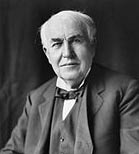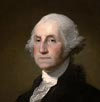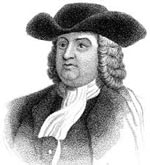
Early life
William Penn was born to a wealthy Anglican family, the son of Admiral Sir William Penn. He was born in Tower Hill, London in 1644, but after a childhood episode of smallpox (where he lost all his hair) the family moved to a small country estate in Essex. He studied at Chigwell School and later Christ Church, Oxford.
Penn’s father had inherited a large estate in Ireland for his service to Cromwell during his conquest of Ireland. When William Penn was 15, the family fell out of favour with Cromwell and they moved to this estate in Ireland. However, a year later, Cromwell died and, as an admiral in the navy, Penn’s father was instrumental in successfully bringing back the exiled Charles II by boat back to England. The King was very grateful for Penn’s service and felt indebted to his family.
Whilst living in Ireland, William Penn was moved by a speech by the Quaker, Thomas Loe, and this awakened an interest in the non-conformist religion. Later, he remarked how this interest was accompanied by mystical experiences.
“the Lord visited me and gave me divine Impressions of Himself.”
The essence of the Quaker religion was to see no intermediary between man and God. As a result, Quakers would not swear an oath of allegiance to either king or Parliament. In the upheaval of the English civil war, this was radical dissent.
After returning to England, Penn enrolled at Christ Church, Oxford University, where he became more involved in discussing dissenting religious ideas with like-minded academics.
When the Oxford theologian John Owen was fired and censured for his dissenting views, the young Penn stood by the dean and continued to associate with him. As a result of his stance, the university fined him, and, worried about the damage to the family reputation, his father removed him from Oxford and later sent him to Paris – hoping he would modify his radical views. But in Paris, he gained further spiritual ideas from Moise Amyraut, a Christian humanist, who Penn liked.
On returning to London, Penn studied law, but London was soon ravaged by the plague and then the Great Fire of London, because of the plague Penn temporarily returned to Ireland.
His experiences helped cultivate a deeper conviction in his Quaker views and he became friendly with George Fox and other prominent Quakers. It was a difficult time to be a Quaker because there were laws designed to discriminate against the religion. Their meetings were often broken up and members fined or jailed for refusing to pledge the oath of allegiance. Penn’s father pleaded in vain to turn his son away from his dissenting faith, but he was unsuccessful.
Due to his profession of the Quaker faith and his virulent pamphlets promoting Quakerism and criticising other Christian faiths, he was sent to prison for short periods of time. On one occasion in 1870, Penn was arrested for holding a non-Anglican religious meeting. The judge, the Lord Mayor of London oversaw the trial and refused to allow Penn even to see the charges laid against him. As a result, the jury returned a verdict of not-guilty. But, despite the verdict of not-guilty, the judge jailed Penn for ‘contempt of court’. He also put the jury in jail, asking them to reconsider. (This led the jury members to appeal and gain the right to be free from the control of judges – an important precedence of habeas corpus and the concept of jury nullification)
Penn was released, but spent several periods of time in jail. In 1669, whilst in jail, he wrote No Cross, No Crown (1669). It was a classic of prison literature – expanding Quaker philosophy in an engaging way. He also wrote an introduction to introduction to the Journal of George Fox. In these writings, he talked about the virtues of early ‘primitive’ Christianity, where the emphasis was on direct communion with God before the established churches gained more power.
“Religion it self is nothing else but Love to God and Man. He that lives in Love lives in God, says the Beloved Disciple: And to be sure a Man can live no where better.”
Fruits of Solitude (1682)
Penn became one of the leading proponents of Quakerism and was defiant about the threat of jail, not holding back on his criticism of religious and political orthodoxy to give a robust exposition of his religious ideals.
“My prison shall be my grave before I will budge a jot: for I owe my conscience to no mortal man.”
– Penn. After being imprisoned in the Tower of London for expressing his ideas on religious freedoms (1668 )
Without his families prestige, Penn may have suffered more stringent punishments. But, given the climate of hostility to Quakers, Penn made plans to leave for the new world in North America, where there was a reputation for greater religious tolerance.
Founding of Pennsylvania
In 1677, with a group of other Quaker entrepreneurs, Penn began to lay the foundations for a new settlement in New Jersey. Penn was still in England, but he enthusiastically drafted a charter of liberties for the settlement. Drawing on his own experiences, he guaranteed free and fair trials by jury, freedom of religion, free and fair elections and freedom from unjust imprisonment.
“no Men. . . hath Power or authority to rule over Men’s Consciences in Religious matters.” (DNB, 434)
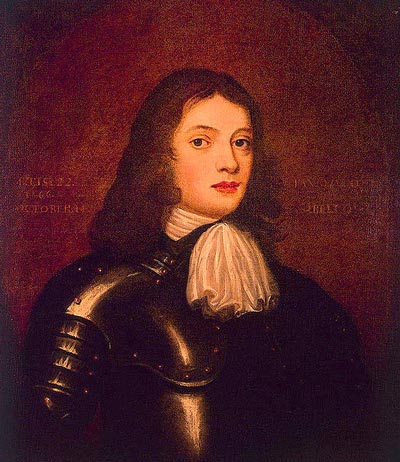
William Penn at 22
The settlement was helped by a legacy from Charles II, who felt he had a large debt with Penn’s father and was willing to provide a remarkably generous area for these political and religious dissenters (Charles possibly saw this as a good way to be rid of troublemakers). The new settlement was term Penn (after Sir William Penn) and Sylvania (woods) With this Royal endowment and successful bargaining, Penn gained an area of 45,000 acres of land
The model town implemented freedom of worship (for those who believed in God) and the pioneering laws of free elections, fair trials and a separation of political powers. Ideas in the Pennsylvania Frame of Government (1682) would form the basis of the American constitution. Penn’s philosophy for separation of powers was based on his desire to reduce the scope for one man’s tyrannical rule. He said the constitution would leave him or future men with:
“no power of doing mischief, that the will of one man may not hinder the good of a whole country.”
The new settlement, which guaranteed religious tolerance attracted settlers from all other Europe, often composed of religious minorities, such as Quakers, French Huguenots (French Protestants), Amish and Mennonites.
In 1682, Penn left England, seeking to help build the city he planned for on paper. He was an instrumental figure in implementing his theoretical policy ideas. Penn combined both idealism, bordering on utopianism, but also practical realism. Where necessary he sought a practical solution, whilst still trying to retaining his belief in liberal government.
Penn implemented a more liberal justice system. Capital punishment was only implemented for two crimes of murder and treason (there were 200 capital offences in England). He also sought to make prisons progressive places of rehabilitation rather than places of punishment. Quakers were also leading figures in the treatment of mental illness, decriminalising it. Through the widespread provision of education, Pennsylvania blossomed as a centre of commerce and science. Penn also implemented strict ‘puritanical’ laws on ‘immoral activities’ banning cockfighting, gambling, and setting laws on drunkenness, swearing and lying.
Accord with native Indians
As well as the politics of the city of Pennsylvania, he also explored the interior of New Jersey, befriending local Indian tribes – especially the Lenni Lenape Indians. He learnt the language and dialects of the main tribes, enabling better communication and helping to foster good relations. Penn ensured the Indian tribes were fairly paid for land, and it was held up as an example of good relations between settlers and native Indians.
“I have great love and regard toward you, and I desire to win and gain your love and friendship by a kind just, and peaceable life; and the people I send are of the same mind, and shall in all things behave themselves accordingly.”
Letter to the Lenape Nation (18 October 1681)
Returning to England after the succession of his friend, the Duke of York who became King James, Penn used his royal influence to gain the release of prisoners of conscience such as Quakers and John Locke. The later Act of Toleration (1689) helped legalise the idea of religious tolerance that Penn and others had argued for.
Penn wrote some visionary documents, including:
An Essay Towards the Present and Future Peace of Europe (1693) – which envisaged an international organisation to help mitigate against European conflict.
In 1699, he proposed the idea of a federation of all the American colonies to promote practical solutions and good relationships. This was an embryonic idea behind the future United States of America. He also proposed the idea of a federation of European States – which is often seen as the forerunner of the European Union.
Later years
In 1701, Penn was forced to return to England, due to financial problems. His financial adviser Philip Ford had defrauded him out of a significant sum, leaving him, in dire financial straits. Ford had taken advantage of Penn’s aversion to detail – willing to sign papers without reading Penn tried to sue Ford in court, but was largely unsuccessful in rescuing his financial situation, and he even spent time in debtors jail for bankruptcy in 1702.
Struggling with financial problems, he suffered a stroke in 1712, which left him paralysed. His last years were not happy ones. He died in 1718 in Ruscombe, Berkshire.
Family
Penn married twice. His first wife Gulielmas Marias Posthumas Springetts died in 1696. He remarried two years after her death to Hannah Margaret Callowhill (who was just 25 when he was 50.) He had eight children from his first marriage and eight children from his second marriage.
Legacy
Penn was considered an early founding father of America. He embodied the American dream of founding a free and fair society, based on republican principles. Several decades later, his pioneering principles of liberal government were incorporated into the new American constitution of 1776.
Citation: Pettinger, Tejvan. “Biography William Penn”, Oxford, UK. www.biographyonline.net, 14th December 2016. Last updated 22 Feb 2018.
William Penn
William Penn by George Hodges at Amazon
Related pages
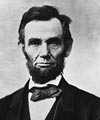
Famous Quakers – 
